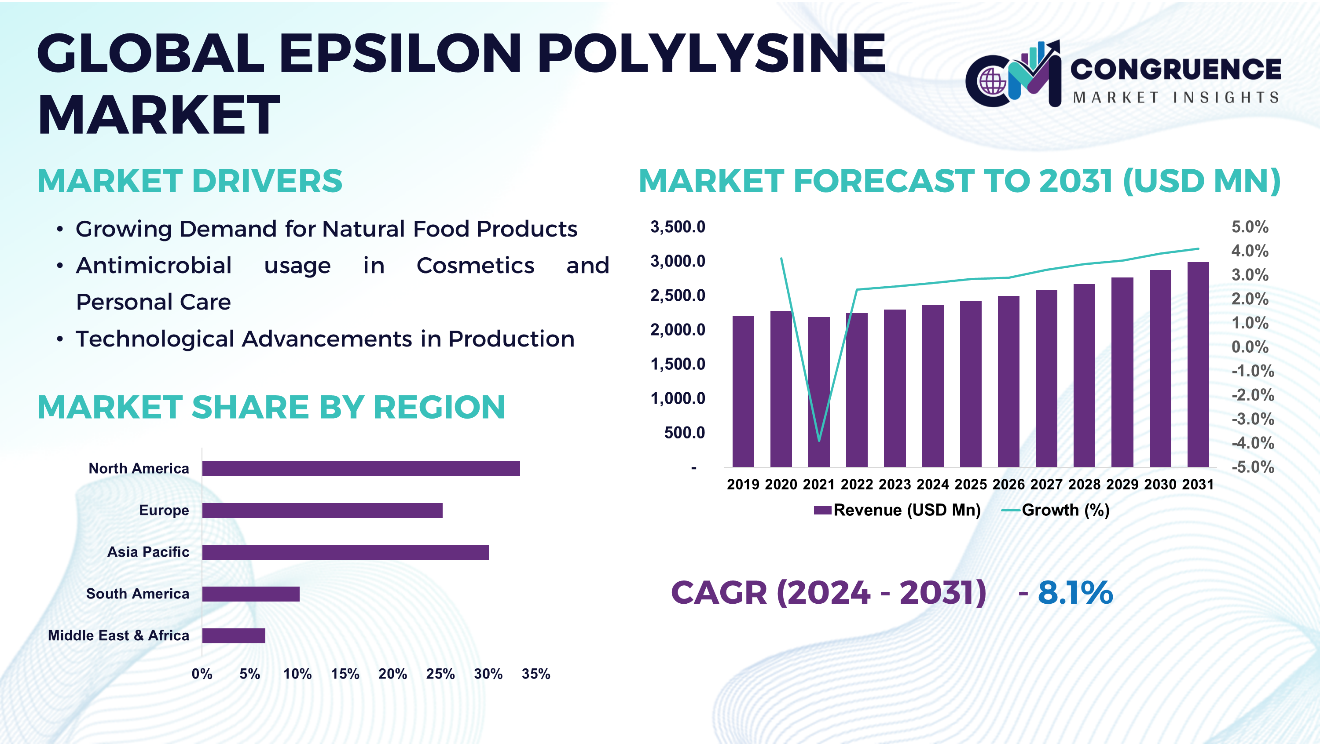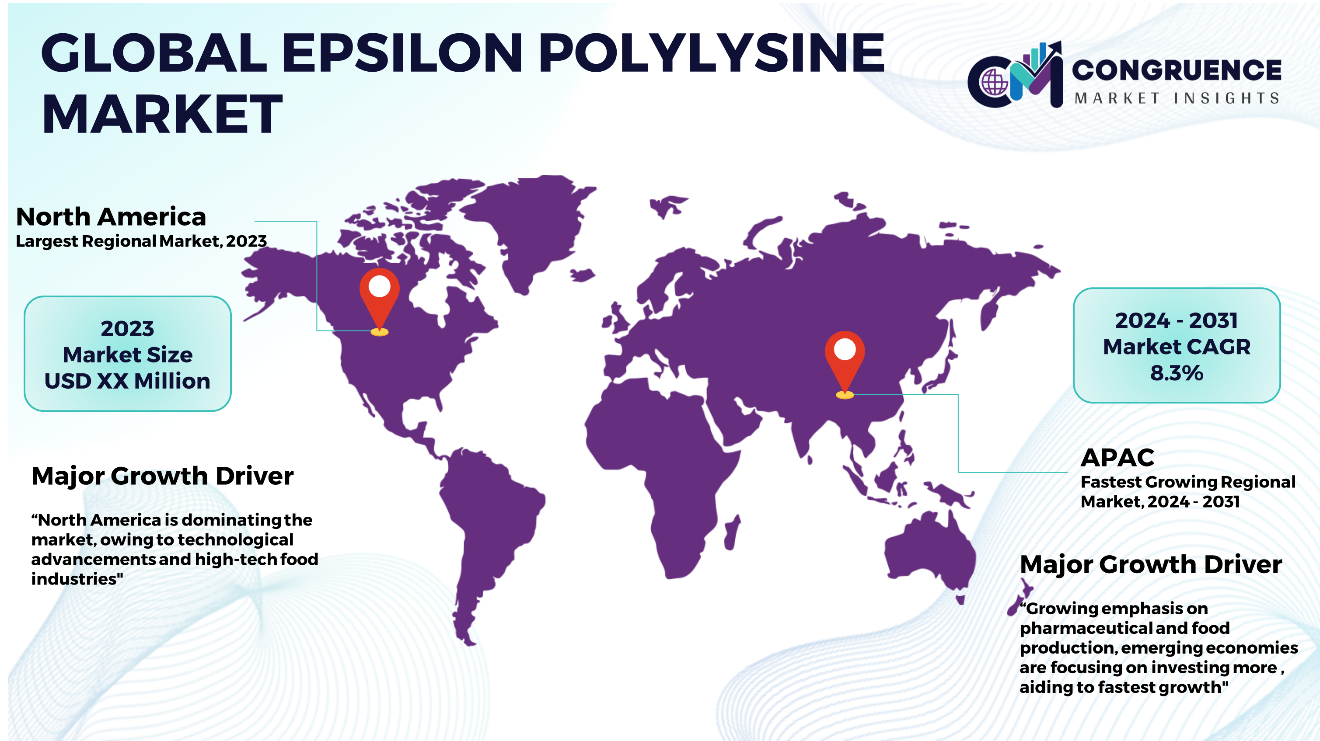Reports
The Global Epsilon Polylysine Market is anticipated to expand at a CAGR of 8.1% between 2024 and 2031.
The Epsilon Polylysine Market is experiencing notable expansion supported by the advancements in process of manufacturing and its increasing applications across the industries. Epsilon Polylysine is primarily synthesized through the microbial fermentations by employing some bacterial strains, that are followed by purification and extraction methods in order to enhance the quality. Furthermore, this natural antimicrobial compound seeks an extensive usage in food preservation, owing to its effective inhibition of bacterial growth and to extend product’s shelf life. In cosmetics and personal care products, this is used as to increase the product safety through its antibacterial attributes. Moreover, emerging industries such as pharmaceuticals and biotech also contributes to the market’s growth by leveraging epsilon polylysine for its properties in drug delivery systems and bio-active materials. The ongoing technological advancements in fermentations and extraction techniques are optimizing production efficiency and ensures to escalate market demand.

Epsilon Polylysine Market Major Driving Forces
Growing Demand for Natural Food Products: The increasing consumer preferences for natural and clean-label food products is a significant catalyst for the epsilon polylysine production and processing industry. The consumers are gravitating towards the healthier food options with minimal synthetic additives. These acts as a natural preservative, that meets the requirements of shelf life extension without restoring to chemical additives. This helps the market to capture the consumer expectations for safer and more natural food options.
Antimicrobial usage in Cosmetics and Personal Care: As antimicrobial properties plays a vital role various industries, so as in cosmetic and personal care products. With the integration of Epsilon Polylysine, manufacturer can enhance products’ stability and safety against microbial contamination. Consumers increasing seek skincare and beauty products that offer effective performance.
Technological Advancements in Production: There is ongoing advancements in production technologies, such as refined fermentation process and purification method, supporting the epsilon Polylysine market’s growth. Furthermore, these technological advancements and innovations enhances the efficiency, reduce the costs, and elevate the quality of epsilon Polylysine. Enhanced production process increases the accessibility of epsilon Polylysine, making it more appealing.
Epsilon Polylysine Market Key Opportunities
Rising Demand for Natural Preservative: The increasing preference among consumer for clean label and natural products presents a notable opportunity for manufacturer of epsilon polylysine. Furthermore, underscore the growing market potential within the food and cosmetics industries for natural preservatives.
Growth of Food & Beverage Industry: Epsilon Polylysine as a food preservative offers avenue for diversifying its applications across various food and beverage categories. This presents an opportunity for the exploration of new product line and formulations aimed at improving shelf life and ensuring food safety.
Advancements in Biotech and Biopreservations: There is a rise in biotechnology are paving the way for innovative usage of epsilon polylysine in bio-preservation. This offers opportunities for its application for its application in preserving cell cultures, enzymes, and other biological materials in biopharma manufacturing and research.
Epsilon Polylysine Market Key Trends
· Biotech innovations has been noticing expansion through epsilon polylysine applications, enhancing bio-preservation and pharmaceutical use for sustainable solutions.
· Increasing emphasis on food safety and concerns regarding shelf-life drives adoption of epsilon polylysine as a reliable preservative in food products.
· Epsilon Polylysine gains traction as a sustainable alternative to synthetic preservative, aligning with the eco-conscious development strategies.
· Contributing to antimicrobial solutions in medical device and formulations, there are emerging applications in healthcare industries.
· Growing preferences for clean-label products which helps epsilon polylysine as the natural preservative.
Region-wise Market Insights
North America accounted for the largest market share at 35.2% in 2023 whereas, Asia Pacific is expected to register the fastest growth, expanding at a CAGR of 8.3% between 2024 and 2031.

In North America, the demand is driven by a robust regulatory frameworks and consumer demand for clean-label products with adoption in the food and pharmaceutical sector. Furthermore, advanced biotechnology infrastructure aids to innovations and expansion of market. With stringent food safety regulations and sustainability initiatives while propelling the use of epsilon polylysine, Europe holds significant position. Whereas, Asia Pacific is fastest growing region owing to rapid industrialization and increasing disposable income that fuels the demand for processed food. South America, present a potential of market’s growth through evolving consumer preferences and regulatory developments. On the other hand, challenges with regulatory compliance and infrastructure, limits the market growth. However, rising investments in healthcare and biotechnology offer potential for epsilon polylysine applications and usage.
Market Competition Landscape
The global Epsilon Polylysine market is characterized by high degree of competition among a large number of manufacturers. Key players in the Epsilon Polylysine market engage in strategies aimed at gaining a competitive edge. These strategies include product innovations, quality standards, regulatory adherence, and market penetrations. Established brands leverage their reputation for quality and reliability to maintain market share, while newer entrants focus on disruptive innovations and unique selling propositions.
Key players in the global Epsilon Polylysine market implement various organic and inorganic strategies to strengthen and improve their market positioning. Prominent players in the market include:
· Merck KGaA
· Lonza
· ADM
· Azelis Americas, LLC
· Evonik
· AB Enzymes
· Amano Enzyme Inc.
· Nagase & Co., Ltd.
· Roquette Freres
· Novus International, Inc.
· KYOWA HAKKO BIO CO., LTD.
· Chr. Hansen A/S (Novonesis)
· Jiangsu Yiming Biological Technology Co., Ltd.
· IngreCore BV
· Henan Daken Chemical Co., Ltd.
|
Report Attribute/Metric |
Details |
|
Market Revenue in 2023 |
USD xx Million |
|
Market Revenue in 2031 |
USD xx Million |
|
CAGR (2024 – 2031) |
8.1% |
|
Base Year |
2023 |
|
Forecast Period |
2024 – 2031 |
|
Historical Data |
2019 to 2023 |
|
Forecast Unit |
Value (US$ Mn) |
|
Key Report Deliverable |
Revenue Forecast, Growth Trends, Market Dynamics, Segmental Overview, Regional and Country-wise Analysis, Competition Landscape |
|
Segments Covered |
· By Form (Powder, Liquid, and Granular) · By Production Process (Fermentation Process, and Chemical Synthesis Process) · By Application (Food Safety and Preservation, Drug Formulations, Skin-care Formulations, Personal Hygiene Products, Biopreservations, and Others) · By End-Use Industry (Food and Beverage, Pharmaceutical and Healthcare, and Cosmetics and Personal Care, and Others) |
|
Geographies Covered |
North America: U.S., Canada and Mexico Europe: Germany, France, U.K., Italy, Spain, and Rest of Europe Asia Pacific: China, India, Japan, South Korea, Southeast Asia, and Rest of Asia Pacific South America: Brazil, Argentina, and Rest of Latin America Middle East & Africa: GCC Countries, South Africa, and Rest of Middle East & Africa |
|
Key Players Analyzed |
Merck KGaA, Lonza, ADM, Azelis Americas, LLC, Evonik, AB Enzymes, Amano Enzyme Inc., Nagase & Co., Ltd., Roquette Freres, Novus International, Inc., KYOWA HAKKO BIO CO.,LTD., Chr. Hansen A/S (Novonesis), Jiangsu Yiming Biological Technology Co., Ltd., IngreCore BV, and Henan Daken Chemical Co., Ltd. |
|
Customization & Pricing |
Available on Request (10% Customization is Free) |
